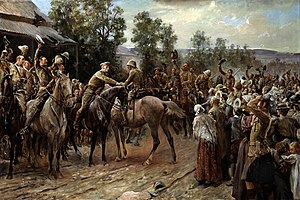| Relief of Ladysmith | |||||||
|---|---|---|---|---|---|---|---|
| Part of Second Boer War | |||||||
 Major Hubert Gough of the relieving force greets General Sir George White in Ladysmith, as portrayed in a painting by John Henry Frederick Bacon. | |||||||
| |||||||
| Belligerents | |||||||
|
|
| ||||||
| Commanders and leaders | |||||||
| Redvers Buller |
Piet Joubert Louis Botha | ||||||
The Relief of Ladysmith consisted of multiple efforts to relieve the city of Ladysmith by General Sir Redvers Buller. Buller and the Natal Field Force attempted to relieve the city through multiple offensive actions. The city had been under siege since 2 November, 1899, and Britain had sent General Buller to relieve the city. After consolidating his Forces at Estcourt through most of November and early December, he began his relief of the city. The attempts to relieve the city started on 15 December at the Battle of Colenso, in which the British forces were repelled by the Boers on the Tugela River. The next two attempts were repulsed by the Boers (Spion Kop and Vaal Krantz), however at the Battle of Pieters Hill in February 1900, the Boers were eventually beaten from the city and forced to withdraw to Botha's Pass near Newcastle. Buller and his Forces entered the city on February 28, 1900, officially ending the Siege of Ladysmith.